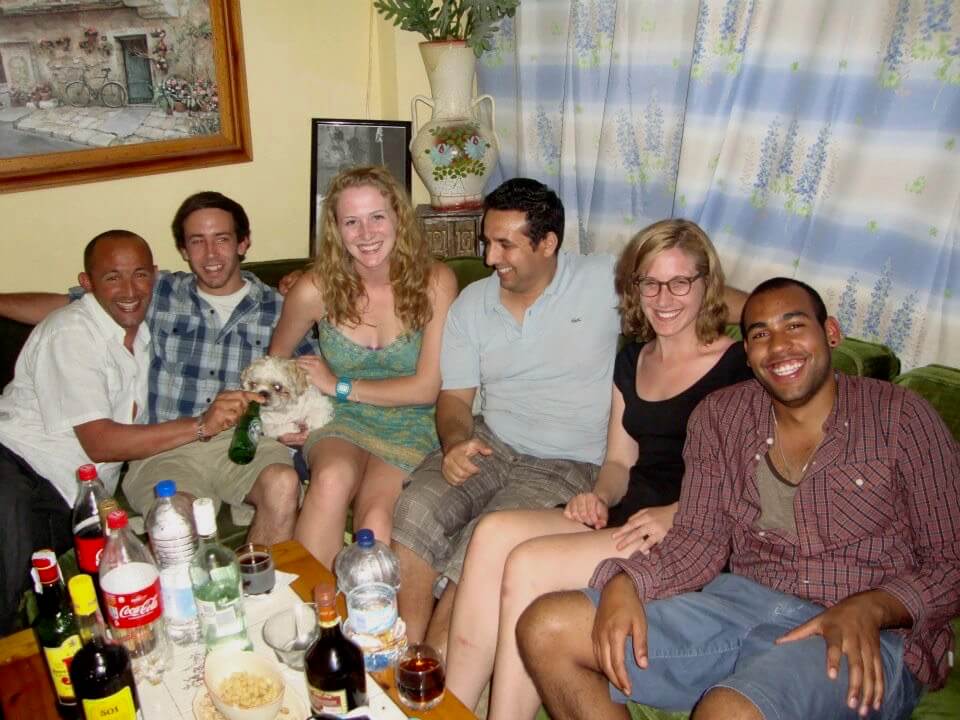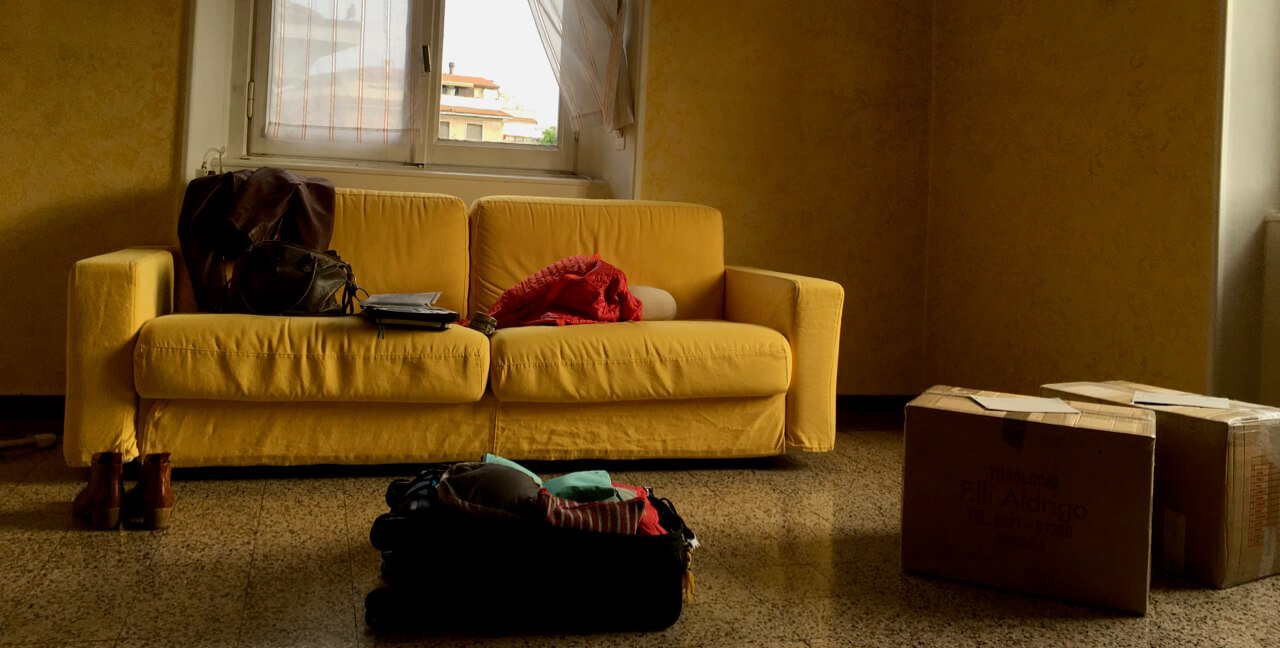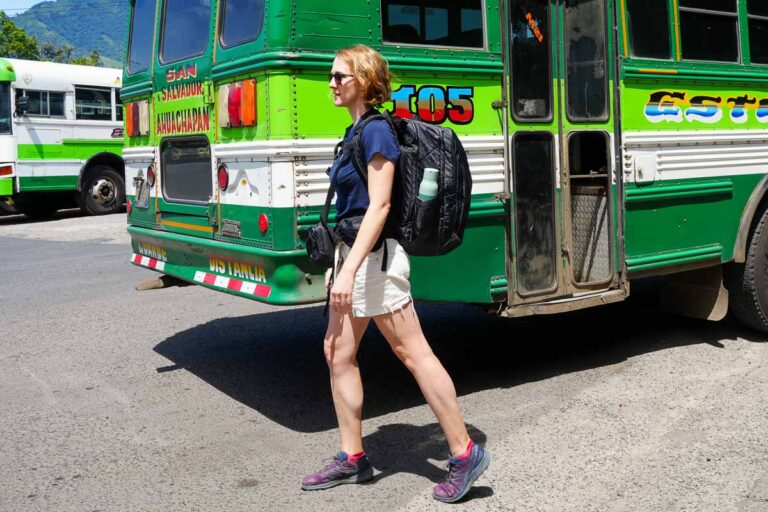It’s 2020… Is Couchsurfing Still a Thing?
While contemplating whether Couchsurfing is still a thing – and how it’s changed – in the age of modern travel, I thought back on some of my favorite (weirdest) Couchsurfing stories. I also answer some Couchsurfing FAQs in this post. For beginner Couchsurfing tips, try this other post.
When I was 19, I slept on a stranger’s slippery, faux-leather couch in a micro apartment in San Francisco’s notorious Tenderloin district. Thanks to my Couchsurfing host, I ended up eating what I’m certain was the best Chinese food in the city, in a restaurant where the menus were all in handwritten in Chinese. And I made some friends whom I stayed in touch with for several years.
At 21, I lead three friends on a wild goose chase through several towns in the south of Spain, in search of our “emergency couch” host, who we found at midnight outside a train station, only to discover his plan was that we’d all go clubbing until 5 am. His friends were Algerian and spoke a mix of French, Spanish, Berber and Arabic. My friends were American and spoke English and various levels of broken Spanish. I did my best to interpret, and had one of the most fun and memorable nights of my young traveling life.

That same year, I stayed with a Polish woman and her family in Krakow. She was a Spanish teacher and was excited to have her young children interact with native English speakers. (The English speakers being myself and another American – my college housemate who’d come to visit me while I was studying abroad in Spain.)
We stayed with another Polish woman that summer, in a tiny apartment in the southern outskirts of Paris. Every morning, she bought a fresh baguette and pain au chocolat from the bakery downstairs for us to have breakfast together. Her apartment was full of records and all her clothes seemed to be shades of cheery French blue. To me, she was the epitome of wise, calm, grown-up and chic. I now realize she was probably about the age that I am now.
These are just a few of my Couchsurfing stories. Traveling this way gave me the kind of experiences that made me fall in love with travel, not only with vacations and hotels. (Although I do enjoy those, too.)
What is Couchsurfing?
If you haven’t tried it, here’s what I’m talking about: Couchsurfing the website began in 2004. That’s two years before Facebook was open to all, and four years before Airbnb – when it was still very weird to meet people on the internet.
(While couch surfing, for my non-American readers who may not know this slangy term, is what young, broke people do when they have nowhere else to live: Rotate through their friends’ living rooms, sleeping on couches and generally leaving only after overstaying their welcome. Everyone in Jack Kerouac’s On The Road does a lot of couch surfing.)
Couchsurfing is a combined social network and travel resource: Locals who want to meet people can host travelers in their homes (overnight, for free). These are the answers to the questions I hear a lot: No, Couchsurfing is not for hooking up. Yes, Couchsurfing is generally safe and totally legal and yes, it still exists – although the community is not as active as it was in its heyday (around the late 2000s).
The fact that people have these questions might be a big contributor to Couchsurfing’s decline: In a time when it sometimes feels like the internet is solely for self-promotion, making money and getting laid, people don’t know what Couchsurfing is for anymore.
Still, Couchsurfing is much more of a social network than Airbnb, which is purely commercial, and much better than Facebook for connecting with people who you don’t already know.
(Related: Check out my favorite creative alternatives to both AirBnb and Couchsurfing, including some great new options for finding homestays with locals, in nature, or even in unused RVs.)
How does Couchsurfing work?
Anyone can set up a profile on couchsurfing.com, where you describe your interests and personality, add some photos, and search for travelers to host in your home, or places to stay. You can put up a “public trip” post saying who you are and where you’re going, and hope someone in the city reads it, looks at your profile and offers to host you based on shared interests. Or you can search through the available hosts in that city and send personalized requests. (Which are much more likely to get a response if they are truly personal – read the potential host’s profile and include something in your request like, “I noticed you’re interested in X, and I am too!”)
And the offers aren’t necessarily just couches. I’ve “couchsurfed” in private guest suites, too. (With the Spanish teacher in Poland, for example.)
Then – this is important – you leave a reference for your host/guest. So if anyone is creepy, scary, flakey or dirty, you can say so in their reference, and the rest of the community will be able to see it. I always read people’s references. It’s common to see references left by solo-traveling women on men’s profiles that say something like, “Super good experience! I stayed at his place by myself for three nights. His apartment is really clean and he was not creepy at all. Thanks for showing me xyz cool thing in the city, John!” These are like gold.
As you could probably guess, I found out about Couchsurfing in college. My housemates hosted many broke, vagabond travelers in our living room, and I started to get curious. After hosting travelers, I started surfing. (And that’s one of the tips I always give for how to get started.)
In all of this, I personally have never had a bad Couchsurfing experience. Mind you, I didn’t say I’ve never had a weird experience.
In fact, maybe half of my Couchsurfing experiences were kind of weird. But it always seemed to be due to the nature of living at a stranger’s house in close quarters, trying to bridge often vast cultural differences. And maybe not even speaking the same language.
How Couchsurfing became what it is today
I started traveling solo a decade ago. By which I mean planning trips myself, often going by myself or with a friend who had the same lack of experience, and relying on just myself to figure things out – no parents, no tour guide. Couchsurfing was a big part of those travels, as I know it was for a lot of travelers. But a lot has changed in the last decade.
Most people say the beginning of the change was 2011, when the former non-profit became a B-corporation (different from a Certified B Corp, which I talk about a lot) and took millions of dollars in venture capital funding. I remember the changes, although at the time I didn’t know the reason. The website became more glossy, and quirky things like the “emergency couch” boards that I had used to find my hard-partying Algerian hosts in Spain, disappeared.
Since then, a lot of the community feeling has gone, too. It certainly is harder to find hosts, but I don’t know if that’s not also because my standards have changed. (Not my safety standards, but my willingness to rough it. I still love to meet people when I travel, but I’m no longer really looking to sleep on living room floors.)
And lots of other copy-cat sites have come and gone – none with much success, except for the really specific ones (such as Wanderful, a women’s travel network I’m a member of and find useful and supportive).
I used to love Couchsurfing but now, I haven’t done it in years. This was immediately clear when I logged into my profile last month and read that my interests included “skydiving, adrenaline, live music, good beer and beautiful tattoos.” I replaced those with “economics podcasts, photography, food culture and writing creative non-fiction.” I feel like I’m 100 years old.
Now, I’m getting ready to head back to Europe after spending the past 7 months in the US (my longest stint in my home country in many years). And I’ve been thinking about how I used to travel and how I travel now, and wondering if I could still surf.
But does Couchsurfing really still exist?
First of all, we’re now in the age of Airbnb. People know that instead of giving away their extra space for the chance of some cultural exchange, or to meet new people, or just to be nice to cash-strapped travelers – as is the philosophy behind Couchsurfing – they could sell it. For cash.
But that possibility isn’t new.
Maybe what’s more relevant than the money is that we seem to be past the phase of the internet when the idea of connecting with strangers around the world, exchanging messages, learning something about them, and then actually meeting in person was something special. That’s not novel anymore. We’ve got Tinder and Bumble and Grindr and whatever else that I don’t know about. Plus creepy, unwanted messages on every platform. Many of our jobs even involve interacting with strangers online. (Yes, you reading this! Hello, stranger.)
What I’m saying is that we’re jaded, and we’ve fully monetized the internet. So is something as quaint as finding someone who’s happy to let me sleep in their house for a couple of nights (in exchange for mere conversation) still possible?
I’m not sure what the answer is, I’m just musing. But I’ve got a quick trip to Portugal coming up, and I really just want to try Couchsurfing again and see: Is anyone on the internet still willing to interact with a stranger if there’s nothing in it for them? Is Couchsurfing still a thing?
Planning My Couchsurfing Trip to Portugal
Everything else about this trip is already so random anyway. When I moved back across the Atlantic this spring, I already had a one-way ticket to Italy booked for December (to catch up with my in-laws, friends and food). But I didn’t know how I’d get back to my apartment in Chicago until recently, when I found a flight from Milan to Porto (Portugal!), with another direct from Lisbon to Chicago two days later… for a grand total of $450.
I’m still cheap like I was in my heavy Couchsurfing days, but I now take direct flights whenever possible, to reduce emissions. And when direct isn’t possible, I look for ways make my layovers count.

That’s why I planned this Porto trip on purpose – knowing I’d need to collect my luggage, spend two nights in a city where I don’t know anyone, and get up early to take a three-hour train ride to the airport in Lisbon. But I wanted it like that! (I also planned it on a whim, all in one evening, while sipping homemade limoncello.)
And since I’m a so-called adult now, I also booked an inexpensive, historical, well-rated guesthouse in Porto’s city center for those two nights.
Yet something made me really want free cancellation for this perfect B&B.
I didn’t have any other plans in mind – after all, I won’t be changing my flight unless Portugal’s TAP airlines goes the way of Iceland’s WOW airlines and I get stuck in Portugal for the rest of my life. But I just had a feeling while I was making this whole plan that I should leave room for ideas. Then, while I was brushing my teeth, one came to me: What about Couchsurfing?
“Abroad” and the Modern Travel Machine
Travel now feels like it’s so much about comparing price tags and reading reviews, trying to curate the perfect experience instead of just letting travel be the experience. For me, this means letting the unknown of visiting a place I’ve never been before really be an unknown, instead of trying to eliminate all the mystery from something that I love precisely because of the mystery that it brings to my life.
Of course I’m guilty of being part of the over-planning travel machine myself. It happens to be a part of my job. (I certainly didn’t leave my guesthouse in Porto up to chance. And I actually love researching hotels, neighborhoods and restaurants.)
But earlier this year, I read a book called Abroad, by Paul Fussell. It’s the author’s interpretation and summary of dozens of travel books and essays from basically the late 1800s to the 1970s. There’s a focus on writing from the between the world wars, and Fussell published the book in 1980, so you get a double historical perspective: Him looking at travel in the ’20s and ’30s, and us looking at a pre-internet perspective on “how travel has changed.” Highly recommended. (You can order Abroad on Amazon here, or via local bookstores here.)
In one of my favorite essays in the book, Fussell describes the difference between exploring, traveling and touring. To summarize:
Exploration is when you don’t know what you’re going to find, and that’s why you go. You might not even know whether you’re going to come back, you go just to find out what’s out there. It’s about the journey and discovery.
Travel means going because you do know what you’re going to find. You’ve seen a postcard, or received a letter from a friend, and it all seemed so intriguing that you just had to go see that place for yourself, perhaps despite a long and inconvenient journey. You go hoping to find the place as described.
Tourism is travel, plus the locals are expecting you; they’re ready to milk you for all you’ll pay, and you’re expecting everything to be done for you. The entire process is commercialized as much as possible, and the whole point is consumption and showing off where you’ve been when you get back home. You do not hope for surprises. (You might rather prefer an all-inclusive resort.)
Before the development of tourism, travel was conceived to be like study, and its fruits were considered to be the adornment of the mind and the formation of the judgment.
Paul Fussell in the essay “Exploration to Travel to Tourism”
People don’t write like that anymore, and most people don’t travel like that anymore, either.
What does that mean for travel today?
In the 21st century, Couchsurfing maybe gets us as close as we still can to exploring – or at least to travel. It certainly avoids the complete commercialization of tourism.
So for this Portuguese side-trip, I’m going to give it a try again. I won’t go to the extremes that I went to to secure my Spanish-Algerian emergency couch a few years ago, but I’ve sent some requests and I’ll see if I find a good fit. (And if I don’t, I still have my guesthouse as a backup.)
Maybe I’ll stay in a stranger’s home again. Or maybe I’ll just find someone to meet up with for a drink or a walk around the city. Either way, I do hope to reconnect with the kind of travel that helped me see the world when I was young and broke. The kind of travel that let me meet people who were happy to tell me their life stories, and help me see what it was like to actually live in a city, instead of just being a tourist.
2020 UPDATES:
Here’s a follow-up on how the Couchsurfing part of this quick trip to Portugal actually turned out, along with some Couchsurfing tips.
And here’s how I spent those two days in Porto, with restaurant recommendations, a great place to stay, and lots of photos!
PS:
I have no financial deal with Couchsurfing at the time of writing this. (I don’t even know if Couchsurfing does that.) This is not a sponsored post. Even if it were, I only recommend companies I use and like, and my opinions are always pretty transparent. It’s always up to you whether you want to give it a try!
Some other links in the post are affiliate links, which allow me earn a commission at no cost to you in this case if you buy something – including the book I recommended from Amazon or via the online indie book seller Bookshop. For more info, please see my Privacy Policy. Thank you for your support!






![Should You Buy Carbon Offsets for Your Travel or… Something Else? [Part 4]](https://www.tiltedmap.com/wp-content/uploads/2023/01/Flatey-Island-Iceland-no-trees-©KettiWilhelm2023-768x432.jpg)

I am awestruck at your blog! As a fellow past couchsurfer I loved how you’ve described the ultimate experience that is Couchsurfing. Your posts have been so refreshing and helpful!
Thank you, Jailyn! That’s really wonderful to hear. 🙂 And I always love to “meet” other Couchsurfers. Keep in touch!
xo
Ketti
Very cool article.
I’m also a long term traveller who’s used Couchsurfing extensively and lived so many amazing experience thanks to it.
After a time well isolated I’m ready to hit the road and once again meet tons of people.
But when I logged on CS I found that I had to pay once again.
So I wondered if I would still find the same reactivity and feeling of community.
Your article brings a lot of valuable thoughts on the evolution of our society.
Thanks, Jojo! I know how you feel about being ready to get back out there again. 🙂
It’s true that CS does now have a paid option (around USD$15 a year, if I remember correctly) but it’s just their “verification” option and totally not necessary to use the site. As I said above, I do think the community feeling has been a bit diluted by people who are using Couchsurfing either to find hook-ups, or looking for nothing more than free places to stay. But I do still find people who have the real CS spirit and want to meet people and/or have a cultural exchange – it just takes a little more work to filter through the profiles than it did a few years ago.
Thanks for commenting and keep in touch!
Ketti
From what I see, myself and other people. The 15$ is not only verification. It’s to use the website. So many people who would mostly host, will less be keen to pay this to welcome people. But somehow this will probably filter members. Good or bad, I don’t know yet.
I just realized a dream with a solidarity challenge
400km by bike with my first online money pot for the indigenous peoples of the Amazon.
With the aim dream of meeting the member of the band Gojira. And yesterday I did!!
It’s all on my Instagram @travelnroll
Awesome reading and helpful tips!! Thank you! I would also like to add that it costs $60 to get verified. Is this a new thing and is it necessary to get good spots?
Hi Vanessa,
Thank you! Glad you’re enjoying the blog. 🙂
I believe the fee for verification has been around for several years, but the fact that you actually have to pay to use the site ($15 a year, or so) is new as of 2020.
In my experience, verification definitely isn’t necessary though! But it might be helpful, depending on how you plan to use CS. For example, I got started surfing about a decade ago. I had a new account with no references, so I did two things: I hosted people, who gave me references as a host, and I traveled with friends who did have references, so they set things up, and the hosts then wrote me references as well, since I’d stayed with them (even though the “bookings” were made under my friends’ accounts).
That’s what I would recommend doing if you want to build up some references instead of paying for verification. Most longtime CSers really don’t care about the “verified” check mark, they care that you’re a real member of the community, have a detailed profile, and write unique, genuine couch requests. (All showing that you’re not just there to use the community for free accommodation.)
I hope that helps! Good luck on your travels and keep in touch. 🙂
Cheers,
Ketti